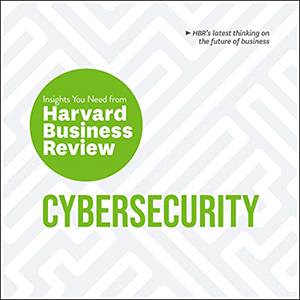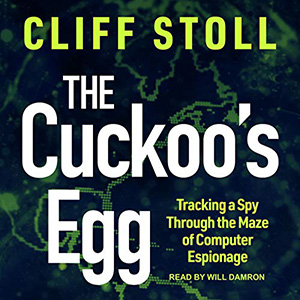7 cybersecurity audiobooks you should listen to this year
Audiobooks have gained enormous popularity among book lovers for a variety of factors, including their convenience, which enables listeners to learn while running errands or traveling.
Here’s a list of cybersecurity audiobooks that are worthy of your time.

Cybersecurity: The Insights You Need from Harvard Business Review
Author: Harvard Business Review

This book brings you today’s most essential thinking on cybersecurity, from outlining the challenges to exploring the solutions, and provides you with the critical information you need to prepare your company for the inevitable hack. The lessons in this book will help you get everyone in your organization on the same page when it comes to protecting your most valuable assets.

Cybersecurity Program Development for Business: The Essential Planning Guide
Author: Chris Moschovitis

This essential guide, with its dozens of examples and case studies, breaks down every element of the development and management of a cybersecurity program for the executive. From understanding the need, to core risk management principles, to threats, tools, roles, and responsibilities, this book walks the listener through each step of developing and implementing a cybersecurity program. From beginning to end, it’s a thorough overview, but it can also function as a useful reference audiobook as individual questions and difficulties arise.
- Speaks specifically to the executive who is not familiar with the development or implementation of cybersecurity programs
- Shows you how to make pragmatic, rational, and informed decisions for your organization
- Written by a top-flight technologist with decades of experience and a track record of success
If you’re a business manager or executive who needs to make sense of cybersecurity, this audiobook demystifies it for you.

If It’s Smart, It’s Vulnerable
Author: Mikko Hypponen

In this book, veteran cybersecurity professional Mikko Hypponen delivers an eye-opening exploration of the best—and worst—things the internet has given us. From instant connectivity between any two points on the globe to organized ransomware gangs, the net truly has been a mixed blessing. In this book, the author explores the transformative potential of the future of the internet, as well as those things that threaten its continued existence: government surveillance, censorship, organized crime, and more.
Listeners will also find insightful discussions of how law enforcement and intelligence agencies operate on the internet, fulsome treatments of how money became data and the impact of the widespread use of mobile supercomputing technology, explorations of how the internet has changed the world, for better and for worse, and engaging stories from Mikko’s thirty-year career in infosec.

Project Zero Trust: A Story About a Strategy for Aligning Security and the Business
Author: George Finney

In this book, George Finney, CSO at Southern Methodist University, delivers an insightful and practical discussion of Zero Trust implementation. Presented in the form of a fictional narrative involving a breach at a company, the book tracks the actions of the company’s new IT Security Director.
Readers will learn John Kindervag’s 5-Step methodology for implementing Zero Trust, the four Zero Trust design principles, and how to limit the impact of a breach. They’ll also find:
- Concrete strategies for aligning your security practices with the business
- Common myths and pitfalls when implementing Zero Trust and how to implement it in a cloud environment
- Strategies for preventing breaches that encourage efficiency and cost reduction in your company’s security practices
Project Zero Trust is an ideal resource for aspiring technology professionals, as well as experienced IT leaders, network engineers, system admins, and project managers who are interested in or expected to implement zero-trust initiatives.

The Art of Deception: Controlling the Human Element of Security
Author: Kevin Mitnick

The world’s most infamous hacker offers an insider’s view of the low-tech threats to high-tech security. Focusing on the human factors involved with information security, Mitnick explains why all the firewalls and encryption protocols in the world will never be enough to stop a savvy grifter intent on rifling a corporate database or an irate employee determined to crash a system. With the help of many fascinating true stories of successful attacks on business and government, he illustrates just how susceptible even the most locked-down information systems are to a slick con artist impersonating an IRS agent.
Narrating from the points of view of both the attacker and the victims, he explains why each attack was so successful and how it could have been prevented in an engaging and highly readable style reminiscent of a true-crime novel. And, perhaps most importantly, Mitnick offers advice for preventing these types of social engineering hacks through security protocols, training programs, and manuals that address the human element of security.

The Cuckoo’s Egg: Tracking a Spy Through the Maze of Computer Espionage
Author: Cliff Stoll

Cliff Stoll was an astronomer turned systems manager at Lawrence Berkeley Lab when a 75 cent accounting error alerted him to the presence of an unauthorized user on his system. The hacker’s code name was “Hunter” – a mysterious invader who managed to break into US computer systems and steal sensitive military and security information.
Stoll began a one-man hunt of his own: spying on the spy. It was a dangerous game of deception, broken codes, satellites, and missile bases – a one-man sting operation that finally gained the attention of the CIA…and ultimately trapped an international spy ring fueled by cash, cocaine, and the KGB.

We Have Root: Even More Advice from Schneier on Security
Author: Bruce Schneier

In this collection of essays, security expert Bruce Schneier tackles a range of cybersecurity, privacy, and real-world security issues ripped from the headlines.
Essays cover the ever-expanding role of technology in national security, war, transportation, the Internet of Things, elections, and more. Throughout, he challenges the status quo with a call for leaders, voters, and consumers to make better security and privacy decisions and investments.
The essays are written for anyone who cares about the future and implications of security and privacy for society.